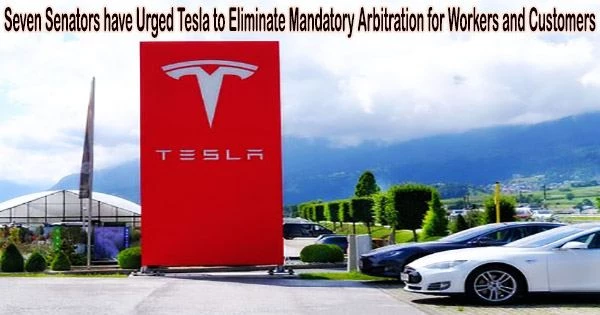In a letter sent Monday (May 8, 2023), a group of primarily Democratic senators pressed Tesla CEO Elon Musk to halt the company’s use of compulsory arbitration clauses in employee and customer contracts.
Tesla, like most large corporations, asks employees to sign an arbitration agreement at hire wherever it is lawful to do so. This means that in order to speak freely in court, where their words will become part of a public record, workers must first get a judge’s exemption from the arbitration agreement.
Such clauses, according to the senators, have allowed workers’ accusations of racism discrimination and other poor working conditions to remain hidden from public scrutiny. The group included Sens. Richard Blumenthal, D-Conn.; Sherrod Brown, D-Ohio; Dick Durbin, D-Ill.; Ed Markey, D-Mass.; Jeff Merkley, D-Ore.; Bernie Sanders, I-Vt.; and Elizabeth Warren, D-Mass.
The letter references details from discrimination lawsuits against Tesla, in which Black workers said they regularly faced racist discrimination at work, and women who worked at Tesla reported blatant objectification and harassment by male co-workers, with little to no support from management. The EEOC, a federal agency responsible for enforcing civil rights laws against workplace discrimination, has previously issued a cause finding against Tesla, the company disclosed in June last year.
The senators wrote workers at Tesla’s Fremont, California factory seem to have brought at least five times as many discrimination lawsuits last year than workers at comparable plants run by other companies.
“Only a few of these cases, however, have managed to survive in court, with most being forced out of court following Tesla’s motions to compel arbitration,” the lawmakers wrote. “The details these cases allege some of which we noted above raise significant concerns about not only Tesla management’s complicity and participation in the discriminatory conditions, but also the untold number of other complaints that remain confidential.”
Forced arbitration clauses in consumer contracts have similarly obscured important details about Tesla’s vehicle safety and business practices from the public, the lawmakers wrote.
“The public deserves the full record of safety complaints about Tesla vehicles,” they said, adding that while clauses in customer contracts can theoretically let customers opt out of forced arbitration, they rarely do so, making the difference basically moot.
Of particular concern to the senators were consumer complaints of phantom braking that occurred in Tesla vehicles.
“Beyond flawed design choices, Tesla’s vehicles appear to be plagued by myriad hardware and software issues: steering wheels in two Tesla vehicles fell off during operation because of a missing retaining bolt, which NHTSA recently opened an investigation into, while another vehicle appeared to spontaneously combust,” they wrote.
“But because Tesla drivers, as a practical reality, are subject to confidential arbitration agreements, we and the public including would-be buyers have no visibility into what complaints may have already been made and what other potential safety issues with Tesla vehicles may exist.”
Beyond asking Tesla to commit to ending arbitration clauses in employee and consumer contracts and to stop filing motions to compel arbitration in court, lawmakers asked Tesla for detailed information on its arbitration practices.
For example, the senators asked how many racial harassment, discrimination and retaliation complaints Tesla received from workers since 2012 and how many were settled or went to arbitration. They asked for the same details about sexual harassment complaints from Tesla workers.
The senators also asked for more information on when Tesla added the ability for consumers to opt out of forced arbitration and how many had actually been able to do so historically.
The senators sought detailed information on the types of vehicle-related complaints they received from customers, which hardware and software factored into those complaints, how many were settled prior to arbitration and how many that went to arbitration were found in favor of the consumer.
Mandatory arbitration is a common practice among new and used-car dealerships, says Paul Bland, executive director at Public Justice, the consumer advocacy group. However, Tesla makes and sells its cars directly to consumers, so its forced arbitration clauses cover more than the norm where auto sales are concerned.
Bland said, “It makes a lot of sense to me that senators would focus on this. Tesla uses arbitration clauses as a tactic to shunt people into a forum that’s pretty rigged for the corporation.”
Arbitration, according to the long-time consumer advocate, is a hidden system that makes it difficult for consumers to learn what happened to them in prior related situations. Arbitration, according to Bland, also makes it more difficult for customers to organize class action cases or simply make informed decisions about where they want to take their business.
















